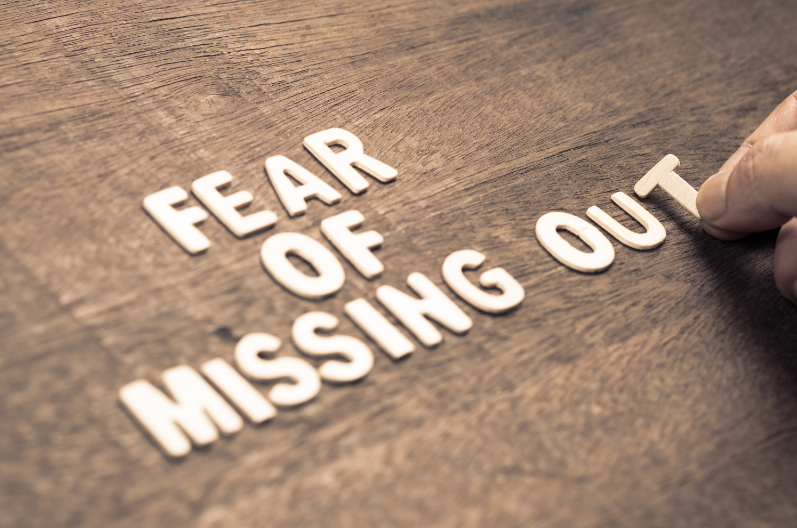“Everyone else is living a cooler life than me.”
This is a prime example of the type of thinking that fuels the fear of missing out, aka FOMO.
While the term FOMO was coined in the 90’s – and social media has rapidly accelerated the issue – the feeling is as old as humans are.
FOMO is the belief that we’re missing out on something critically important, which others are experiencing. This provokes feelings of helplessness and anxiety.
FOMO can apply to any experience, from vacations to promotions, relationships, wealth, etc.
Constant access to other people’s lives via social media provides the perfect landscape for harmful self-comparison.
This article explores tips for how to deal with FOMO.
Signs of FOMO
- Negative feelings when not attending an event/activity
- Fear that others are living more exciting lives
- Low life satisfaction
- High social media/phone use
- Jumping from one trend or project to the next
- Pre-occupation with the opinions of others
- Never saying no to invitations or activities
- Over-booked schedule
- Going out when sick or not wanting to
Enjoy Everyday Living
We live in a fast-paced society. Our food is fast, our communication is faster, and our technological landscape is rapidly evolving.
It can be easy to get swept away in the hustle, believing we have to do and see it all.
However, when our desires constantly shift from one thing to the next, we miss the actual life that we’re living.
Practicing mindfulness can be very useful for living in the present. We can have mindful moments wherever we are.
- Enjoy a meal without distraction. Notice the look, taste, texture, and smell of the food.
- Walk the dog without scrolling social media for the latest happenings.
- Stop and listen to the birds for a moment before heading to work.
- After waking up, take 30 minutes to complete a morning routine (stretching, hydrating, coffee, etc.) before checking the phone/social media.
Practice Gratitude
When we practice gratitude, we choose to focus on what we have, rather than what we lack. This shifts our perspective, allowing us to be more thankful for the life we live.
We can have gratitude for people, items, and experiences, and can express it in many ways. We can:
- Think about three things we’re grateful for each night before going sleep.
- Give someone a gift to show appreciation.
- Look at old pictures and reminisce about the good times we’ve had.
- Think about all the places we’ve been, and what we appreciated about them.
- Tell someone how they’ve positively impacted us.
- Think about the cool things we’ve done, and the fun we’ve had.
Get Passionate
As mentioned, FOMO may cause us to engage in activities we don’t even care about, just to say we did. While this may provide temporary comfort, it’s ultimately unfulfilling.
Instead, we should do things we feel passionately about, even if they aren’t what everyone else is doing.
Doing activities of our choice simply because we like them increases life satisfaction and personal well-being.
Also, passion drives us to explore our interests. When we do this, we may naturally seek out other activities and people that align with our interests. This leads to genuine experiences and connections.
Exploring our passions gives us a sense of identity. This allows us to determine what’s worthwhile to pursue, and what we can do without.
When we understand this, we learn to let go of desires that don’t hold meaning for us.
Quality Not Quantity
Social media can lead us to believe that everyone has a luxurious lifestyle, a bustling social life, and endless happiness.
But, as we know, we only see the highlights of other people’s lives online.
Instead of trying to have the most friends or the biggest house, we should focus on creating meaningful relationships and experiences.
The memories and bonds we build are longer lasting than the temporary joy from doing/getting something for the sake of it.
Limit Social Media Use
FOMO leads to higher social media use. This makes sense, as we want to keep up with everything that’s going on.
However, social media has been linked to depression, anxiety, and loneliness.
A study asked college students to limit social media use to 10 minutes per day, per platform. Many reported a significant decrease in FOMO, anxiety, and depression.
Reducing social media use helps us limit how much we’re comparing our lives to others.
Society encourages a go-go-go, always-strive-for-more mentality. Combined with a continuous feed of people’s accomplishments and highlights, it’s a recipe for comparison.
If these comparisons lead to negative self-evaluation and FOMO, we should take a step back to gain perspective.
Life is made richer by the quality of our experiences and loved ones, not the amount we have.
Sources
https://shorelinerecoverycenter.com/10-symptoms-of-missing-out-fomo/
https://sci-hub.se/https://doi.org/10.1521/jscp.2018.37.10.751


